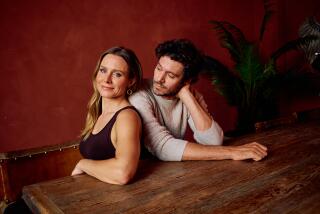Broderick Case Wounds Healing Slowly : Memories: A friend of the family found the idea of watching the TV movie about the crime too painful to bear.
- Share via
Most of all I remember the piano. It graced the living room of the Broderick family’s home. Covered with family photographs, the smiling faces detailed the saga of a family.
So I didn’t watch the program about the Broderick family on television last week. I feared that Hollywood would include the piano and all the pictures, and I would have to experience the pain again.
“Now is the time for healing,” the judge remarked after he sentenced Betty Broderick for the killings of her ex-husband, Daniel, and his new wife, Linda Kolkena Broderick. For the friends who remember the piano, and for our children who romped through the Broderick’s living room, the healing is just beginning.
For the Brodericks were a family. And there are no flawless families--in most, there is some degree of dysfunction. Like most families, Betty and Dan Broderick started out with a dream, and slipped into the assigned roles relevant to their era.
There was a father who embodied the “American Dream” of succeeding in school and establishing himself in a profession. There was a mother who also embodied that dream by devoting her life to her husband and family.
A father who worked diligently in his profession and was not offered a position because of a family name or wealth, but rather on merit. A mother who baited the fishing hooks for two small boys on a boat at 6 in the morning, and could always be counted on to drive for the class field trip.
A father who valued friendship and cultivated many friends. A mother who opened her closet to friends when they needed a special outfit. A father who rooted for his children at a Saturday afternoon soccer game. A mother who would affirmatively answer the question on the sign-up sheets for youth soccer, “Will you coach?”
A father who assisted those in his profession who would profit from his knowledge. A mother who passed two afternoons teaching a friend how not to lead when she danced.
We have read the saga of the Broderick family with our morning coffee. And our children have been witness to it all. They have seen the mother in a murder trial, the same mother who allowed them to carry puppies throughout her house and jump on her trampoline.
Our children have read about the Broderick’s four children, who were their friends and classmates. Our children’s school essays have contained references to the Broderick family. Their teachers have listened to their apprehensions. We also saw friendships broken when “sides” were drawn. Even sadder were the marriages closely related to the case that suffered.
Now is the time for the healing to begin. We will move on with our lives but the narrative of the Broderick family lingers.
When the prosecutor answered the question, “Where are you going to go now?” with the word Disneyland, we are reminded that this family will never experience that level of fantasy again.
When we read of a judge ordering a divorcing couple to seek an arbitrator, we wonder whether the Broderick family story influenced the judge’s decision.
When we see a notice at the university of a meeting of “Adult Children of Divorce--grieving the loss . . . of childhood, breaking free of family roles, attending to unfinished emotional business,” we think of the four Broderick children.
When we spend an evening with a couple unhappy with their union, yet staying together “until the children are older,” we think of Dan Broderick’s unhappiness with his marriage.
When the teaching assistant laments the lack of good, and affordable, child care and questions whether the pursuit of her doctorate is substantiated, we recall Betty, a bright mother who lost her identity in a marriage.
When we hear a mother chastise her grown daughter for continuing a career and leaving her children to someone else’s care, we remember how Betty struggled to re-enter the work world after being absent for years.
But we who knew the Broderick family can do more than remember. We who are healing can make a difference in our families, our educations and our professions.
We can listen more carefully to a client, a friend or a student involved with a family problem. We can work for better child care, and encourage more young mothers to continue in their educations and careers. We can demand that the needs of an overloaded court system be addressed. The cries of social workers, probation and parole officers operating in a quagmire of cases and paperwork as a result of families in crisis can be heard by us. We can be the ones who recognize that many of the problems in the schools are byproducts of a society with families in crisis.
But first must come a time of healing for all of us who remember a piano filled with pictures.


